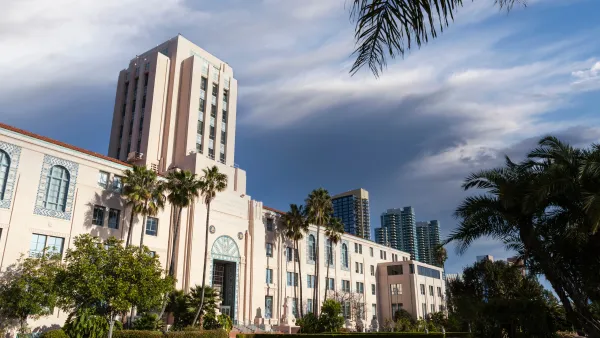Like many cities in California, San Diego is struggling to form a policy around the booming medical marijuana dispensaries that have popped up around the city. The first place they're starting is with land use restrictions.
Host Maureen Cavanaugh talks about the policy formation with Alex Kreit, chair of the city's medical marijuana task force and professor at Thomas Jefferson School of Law.
"CAVANAUGH:The task force seems to have approached this question from a land use perspective. Why is that?
KREIT: Well, the city council directed the task force to look first at land use and zoning because I think that that is probably the most pressing issue within San Diego as it relates to collectives and cooperatives. And so for that reason, it is important to note that these recommendations are by no means comprehensive of all of the issues that can arise out of collectives and cooperatives and medical marijuana. We'll be continuing our work in the new year to look at some of the other issues as it relates to policing, as it relates to potentially, you know, background checks or those types of issues, so there's other issues that might come up, that will come up, in the future in the new year. But we started out with the land use and zoning at the direction of city council because I think that they realize that the first thing that we need to do is to make sure we get a handle on this from the land use and zoning perspective so that collectives and cooperatives aren't just allowed to open up shop anywhere without getting a permit, and that's what's frankly been happening now and I think that's what's led to the concerns by a lot of the citizens who say, look, I support medical marijuana, I don't have a problem with allowing some dispensaries if they're in the appropriate locations if they're well regulated but they see these fly by night operations opening up and they say, this isn't right. And so I think that that's why the city council said the first thing we've got to do, get a handle on this, get some land use and zoning recommendations in place and, hopefully, from these recommendations get some actual regulations in place, get an ordinance together, and I think that that would – I think that's the first piece of the puzzle to getting a handle on this and getting this under control."
FULL STORY: Limiting Medical Marijuana Dispensaries In San Diego

Analysis: Cybertruck Fatality Rate Far Exceeds That of Ford Pinto
The Tesla Cybertruck was recalled seven times last year.

National Parks Layoffs Will Cause Communities to Lose Billions
Thousands of essential park workers were laid off this week, just before the busy spring break season.

Retro-silient?: America’s First “Eco-burb,” The Woodlands Turns 50
A master-planned community north of Houston offers lessons on green infrastructure and resilient design, but falls short of its founder’s lofty affordability and walkability goals.

Test News Post 1
This is a summary

Analysis: Cybertruck Fatality Rate Far Exceeds That of Ford Pinto
The Tesla Cybertruck was recalled seven times last year.

Test News Headline 46
Test for the image on the front page.
Urban Design for Planners 1: Software Tools
This six-course series explores essential urban design concepts using open source software and equips planners with the tools they need to participate fully in the urban design process.
Planning for Universal Design
Learn the tools for implementing Universal Design in planning regulations.
EMC Planning Group, Inc.
Planetizen
Planetizen
Mpact (formerly Rail~Volution)
Great Falls Development Authority, Inc.
HUDs Office of Policy Development and Research
NYU Wagner Graduate School of Public Service




























